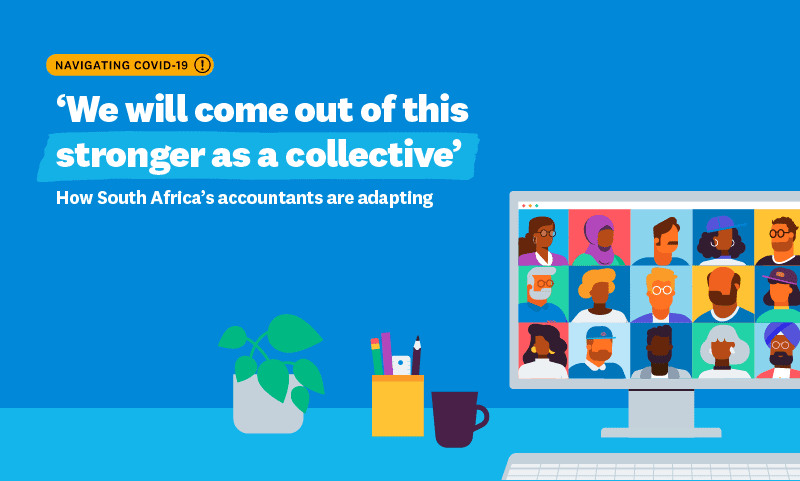
‘We will come out of this stronger as a collective’ – How South Africa’s accountants are adapting


It’s the most challenging time in living memory for businesses across South Africa and around the world. To get by, business owners are turning to trusted advisors, and for many, their accountants are the first line of support. From managing cash flow to determining eligibility for aid, we’re proud to see the country’s accountants step up to support businesses.
Accountants, a group recently acknowledged by South Africa’s Minister of Finance as being an ‘essential service’ during level 4 of the lockdown, are now more critical than ever in ensuring the survival of small businesses. We asked several of our accounting partners how they have adapted, and the positives emanating from this situation.
Adapting to a new way of working
Fortunately, from what we have seen among many of our partners, accountants have adapted fast to the changes demanded by the lockdown. This has meant they’ve been able to support the SME industry with minimal disruption. This, in part, is due to a lot of firms already using cloud solutions – meaning they can collaborate on work remotely and easily share financial data with clients in real-time.
“We’ve invested in digital infrastructure and transformation over the past several years, which means we were able to operate fairly normally while working from home,” said Arnold Scholtz from ASL.
Many companies are fortunate enough to have infrastructure in place to support working from home, but they have still had to adapt their routines. “Staying connected with our team and clients has been really important, so we have regular Zoom chats to touch base,” said Simon Magner from Iridium. “There is much uncertainty at the moment,” he continued, “so, beyond being technically able to work remotely, one of the most important things for us has been supporting the team as much as possible during this transition.”
Advice for small businesses
Everyone we spoke to emphasised the added value of digital and cloud-based alternatives. As Arnold puts it, “If you haven’t already moved to digital, now is the best time to do it. We don’t know what the new normal will look like, but we can be sure that we won’t return to the old way of doing things.”
Simon underlined the importance of managing your figures at a time like this. “Get on top of your numbers,” he said, “and be careful with spending because small mistakes now can have a big impact later.” The key, he suggests, is “to know exactly what’s going in and out of the business.”
Montaque Swanepoel from CFO360 added that the crisis has “demonstrated very clearly the value of being able to make quick decisions – and that you need real-time information ready to be able to do that.” In many cases, he says, “that just may be the difference between having a viable business when this is done or not.”
However, the challenges ahead are significant. “The rapid pace at which regulations are changing at the moment,” says Arnold, “makes it difficult to render advice on a cost-effective basis, both for us and the client.” Businesses also need to “understand that people are facing additional pressures and should not put too high an expectation on them,” says Simon.
Supporting each other
Despite the uncertainty, the crisis has brought out the best in many businesses. The accounting industry is coming together to support them all, including those who might be struggling. In the words of Buchule Sibaca from SMTAX, “We will come out stronger as a collective. Most of us – despite being competitors – are working together: it’s the bigger ecosystem we are trying to protect.”
In particular, Buchule is looking out for practices that weren’t online before the crisis. “We’ve also been thinking about how we help other people who are not our clients,” he says. “We’ve been offering guidance to these businesses.” This sort of collective support is vital to ensuring that the entire industry survives this crisis and can thrive once again.
Share this article
[addtoany]